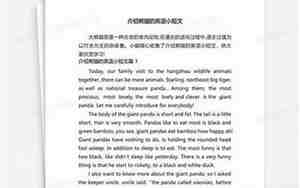英语小短文如何写好听

写一篇英语小短文,让它听起来既地道又吸引人,需要注意以下几点:
1. 词汇丰富: 选择恰当的词汇,避免过于简单和重复。尝试使用各种词性(名词、动词、形容词、副词等)和句型(简单句、并列句、复杂句),让文章的表达更加丰富。
```markdown
例句:Instead of using "happy," try saying "ecstatic" or "overjoyed."
2. 句子结构: 注意句子的长度和转换,保持句子既有平衡又有变化。使用复合句和从句可以使故事更连贯,而不是只有简单的陈述句。
```markdown
例句:Instead of "I went to school. I studied. I came home.", say "Beneath the bright sun, I embarked on my daily odyssey to school, diligently immersing myself in studies, before returning to the haven of my home."
3. 节奏与韵律: 尽量让句子的节奏感自然,适当使用连词和标点,避免冗长或断句,保持流畅。
```markdown
例句:"The wind whispered through the leaves, as the sun's warm glow painted the sky in hues of orange and gold."
4. 情感表达: 使用形象生动的形容词和比喻,传达情感,让读者仿佛身临其境。
5. 语调与语法: 保持正确的语法结构,避免语法错误。如果可能,可以请教专业教师或使用语法检查工具。
6. 主题清晰: 讲述一个明确的主题或故事,确保每个段落都有一个中心思想,这样读者更容易跟上并欣赏你的故事。
记住,写好听的英语小短文是一个演练的过程,多读多写,不断修改和提升你的写作技巧。
写英语小短文的格式
英语小短文的格式可以根据写作目的和类型略有不同,但基本结构通常包括以下组成部分:
1. : 如果有,应简洁明了地概括文章内容,如 "A Day at the Beach"。
2. 段落布局: 通常至少包含一到三个段落,每个段落围绕一个主题展开。这样的结构有助于保持清晰和连贯性。
引言句 (Introduction): 开始时引入主题,明确你要讲述的内容或提出观点。
主体段落 (Body Paragraphs): 每个段落中应有一个中心句,然后用相关细节和例子来展开论述。使用并列或因果关系来组织内容。
转折/递进句 (Transition Phrases): 如 "Furthermore" 或 "However" 等,帮助连接思想,让文章流畅过渡。
结论句 (Conclusion): 概括或总结段落内容,或对全文主题进行总结或提出个人观点。
3. 语言表达: 使用完整的句子,避免过于简略的短句。注意词汇的多样性,以及正确使用时态(如一般现在时、过去时、进行时等)。
4. 标点符号: 保持句子和段落之间的平衡,正确使用逗号、句号和问号等标点符号。
5. 格式规范: 如果是写作任务,比如作文,可能有特定的格式要求,如字数限制、段落开头空格等,一定要按照要求来。
6. 结尾: 可以用简短的总结或者富有启发性的结束语,给读者留下深刻印象。
例子:
```
Title: My Adventure in the Forest
Amidst the lush greenery, my heart pounded with excitement as I embarked on my forest exploration. The sun's warm rays filtered through the canopy, casting a dappled light on the forest floor. _(_Here, you could start a paragraph about the sights, sounds, and experiences)_.
As I ventured deeper, the vibrant bird songs and rustling leaves created a symphony. A sudden rustle from the bushes signaled a deer, swiftly vanishing into the undergrowth,(_example of a transition_). My adventure taught me the beauty of nature's hidden rhythms.
In conclusion, this trek was a reminder of the power of the great outdoors, inviting me to further explore the uncharted territories that lie beyond.(_Summary or reflection_)
```
遵循这些基本格式,你的英语小短文就会既清晰又有组织。
英语小短文该怎么写
写一篇英语小短文,首先需要明确内容和目的,然后按照以下步骤进行:
1. 确定主题: 选择一个简单、易于理解的主题,如描述一个地方、讲述一个故事或论述一个观点。例如,"A Visit to a Park" 或 "My Favorite Book".
2. 制定大纲: 想想你想通过短文传达的信息,列出主要段落和要点。例如,开头可以描述公园的外观,接着可能讲述在公园里的活动,最后是感受或启示。
3. 写作结构: 用完整的句子开始,保持段落清晰。每一段应该有一个中心思想。使用过渡词(如"Firstly", "Secondly", "Moreover")来连接思想。
4. 描写细节: 描述令人感兴趣的场景、感受或人物,用生动的语言刺激读者的感官。例如,使用形容词、动词和比喻。
5. 语法和拼写: 确保语确,避免常见错误。使用恰当的时态(例如,一般现在时、过去时或将来时),并注意单词拼写。
7. 结尾: 可以是一个总结、感想,或者对主题的反思或展望。确保结尾既是对文章的收束,又能给读者留下深刻印象。
8. 检查和修改: 读一遍你的短文,看是否有逻辑不清楚的地方,是否需要添加更多细节,或者是否需要改进段落之间的转换。
例子:
```
Title: A Day at the Beach
The sun was blazing high in the sky as I arrived at the picturesque beach, its golden sand stretching as far as the eye could see. _(_Describing the scene)_ Firstly, I strolled along the shore, feeling the grains of sand tickle my bare feet. The ocean waves, a soothing lullaby, beckoned me to dip my toes in.
Secondly, I found a quiet spot to set up my umbrella and settle down with a book. The salty sea breeze, interrupted only by the occasional seagull's cry, created the perfect ambiance for reading.(_Adding a touch of personal experience_)
As the day wore on, I watched the world around me, realizing the pleasure of being amidst nature's beauty. A day at the beach wasn't just about the sun and sand, but the moment of peace it offered.
In conclusion, my beach visit served as a much-needed respite from the hustle and brought a renewed sense of tranquility.(_Reflecting on the experience_)
```
遵循这些步骤,你的英语小短文会更有条理,更容易吸引读者的注意力。